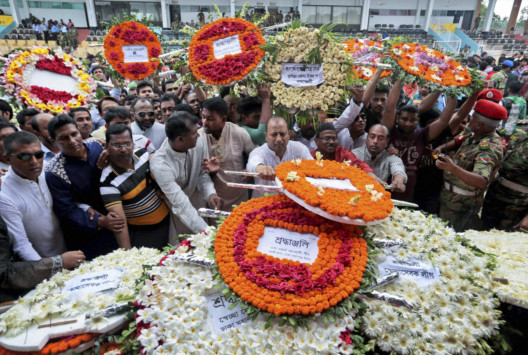
The attack on a cafe in Dhaka and Daesh (the self-proclaimed Islamic State of Iraq and the Levant) were the focus of the region’s papers this week.
The Dhaka massacre, in which 20 people were killed, signifies a dangerous development in the expansion of terrorist organisations, said UAE’s Al Khaleej.
“After it was recently revealed that Daesh is trying to set up a terrorism network in Southeast Asia, there was fear that there might be an escalation in terrorist attacks in the region, particularly in Pakistan, Bangladesh, Philippines, Malaysia, Indonesia and Thailand. The attack in Bangladesh goes against all laws and values, but it is also an indication that terrorist organisations are expanding from the hotspot of origin, Syria and Iraq, and are now spreading to Turkey, Lebanon and the Jordanian borders. Perhaps the Dhaka massacre is Daesh’s response to the field losses it incurred in Iraq and Syria. The attack emphasises the need for more internal follow-up and determination, as well as international coordination to combat this danger.”
It seems like every day there is an attack that threatens the lives of innocent civilians in the US, Europe, Asia and Africa, said Qatar’s Al Sharq.
“Last week there was the attack on Ataturk Airport in Turkey, a bombing in Bahrain’s village of East Akar and recently there was the attack on a cafe in Dhaka, Bangladesh. The attack contradicts all humanitarian and religious values and principles. Terrorism has become a global threat to international peace and security. Nations can no longer hesitate in combating this threat with resolve and determination. The focal point for the international community in its fight against terrorism remains the ability to find radical solutions and fair settlements for crises in the region and Middle East.”
Daesh are a scourge on the entire world, and attempts by a number of politicians to redirect this common disease to serve their own narrow political and sectarian ambitions are just as deadly as Daesh itself, said Lebanon’s Daily Star.
“Hopefully, by now that message has been well digested and understood by both Lebanese and regional leaders whose countries are on the front lines of the raging inferno of terrorism. It is about time that the whole world devises an effective strategy to not only quell this phenomenon but also eradicate it once and for all. Such a step needs transparency and action above the table because groups like Daesh have survived and even flourished in the shadow of opportunistic policies that used them to further their own agendas. Such politicians should realise that they have created Frankenstein’s monster, and it is their duty to put it down before it devours them along with everyone else.”
One can assume that modern day terrorism acts like transcontinental companies, working on a multinational capacity and dependent on promotion and trade, said the London-based Pan-Arab paper Asharq Al Awsat.
“In the past 10 years, we have seen many manifestations of extremism traveling to Bangladesh from Middle East, via extremist religious preaching and collecting funds in the name of charity. There are no occupying forces or foreign powers in Bangladesh. There is no civil war and most of its population is Muslim, the majority being Sunni. What is happening in Bangladesh is happening in several other countries. However, cooperation between countries is limited as to enhance the process of exchanging information about potent terrorist groups and criminals, and their financial transactions and marketing tools. Current cooperation does not tackle primary terrorist ideology, nor does it address environments fostering extremist mind-sets. What is the point of this delayed cooperation when the disease has spread?”




_resources1_16a31069e4e_small.jpg)







